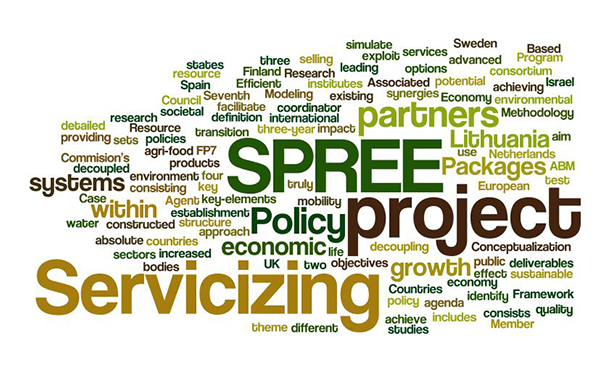
SPREE Project: the servicizing economy
by Tim Willmott : Comments Off on SPREE Project: the servicizing economy
Green growth policies, aiming to improve resource productivity through supply side measures such as supporting eco-innovation or facilitating sustainable use of raw materials, have achieved only relative decoupling since they have inevitably led to rebound effects through the increased scale of consumption.
The challenge is to design policy instruments which integrate both supply and demand side policies influencing both production and consumption patterns together with positive societal effects. SPREE Project is constructed with the overarching goal to assist and enhance the development of a resource-efficient Europe, characterized by an absolute decoupling of economic growth and social prosperity from unsustainable use of resources.
Spree Approach
SPREE project proposes to face this challenge through Servicizing policy directed at achieving absolute decoupling together with positive societal advantages.
Servicizing systems facilitate the transition from selling products to providing services. Such transactions include
- renting cars instead of buying them;
- contracting services of irrigation instead of acquiring irrigation systems; or
- securing server capacity instead of procuring computers.
Servicizing can provide an incentive for suppliers to increase the durability of the products by changing their business models and redesigning products. On the other hand, consumers are provided with the economic incentive to use products in a more efficient way.
Servicizing has an unprecedented potential to radically modify production and consumption patterns and to achieve absolute decoupling of economy, ecology and societal change. The transition from products to services and its potential economic, environmental and social effects will be evaluated in different perspectives, looking at consumer behaviors, infrastructure, eco-innovation, business models and policy aspects around that topic. These issues will be demonstrated via three distinctly different case studies: water, mobility and agri-food.
-
Key Facts:
Project start: 1 July 2012
Project end: 30 June 2015
Funding Scheme: European Commission’s Seventh Framework Program
EU Contribution: 2,400,000 €Project Coordinator:
Prof. Eugenijus Butkus,
Research Council of Lithuania
Project Manager:
Ms. Yael Marom,
The Jerusalem Institute for Israel Studies






Comments are closed